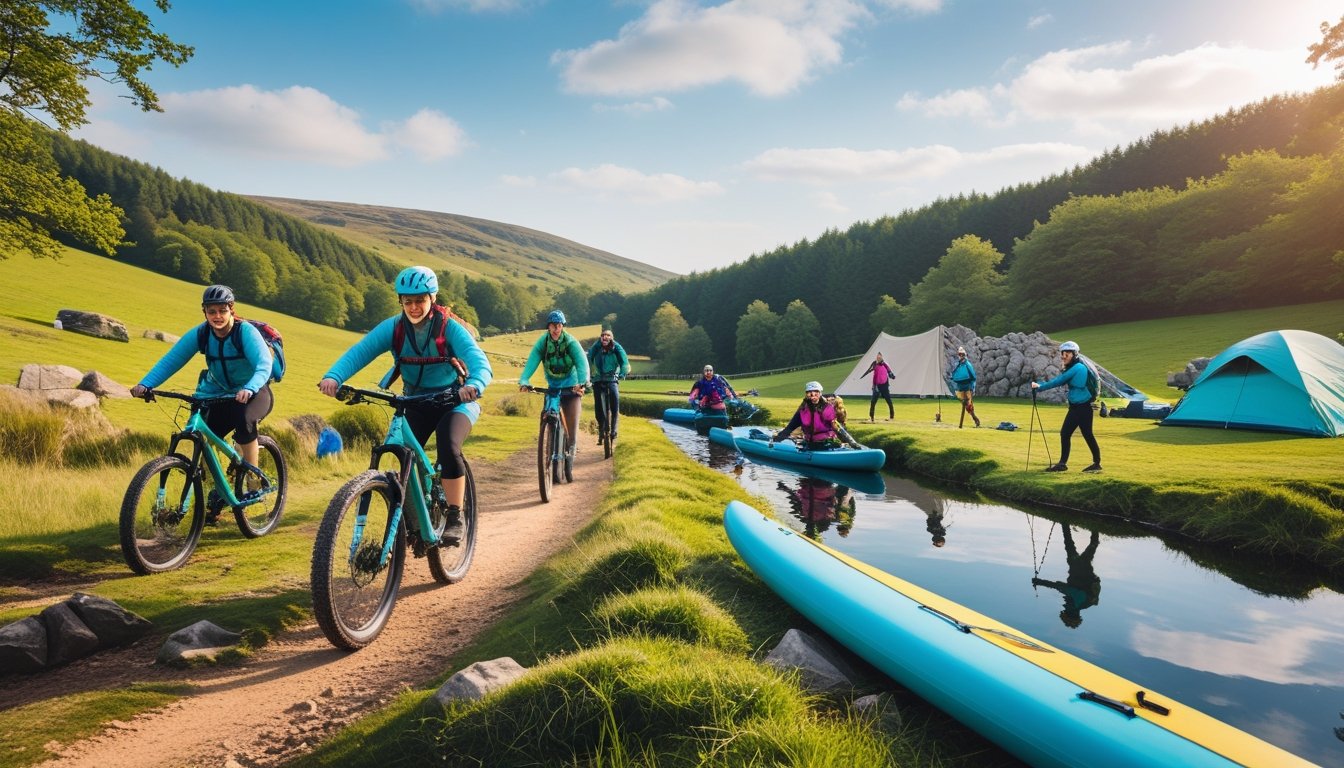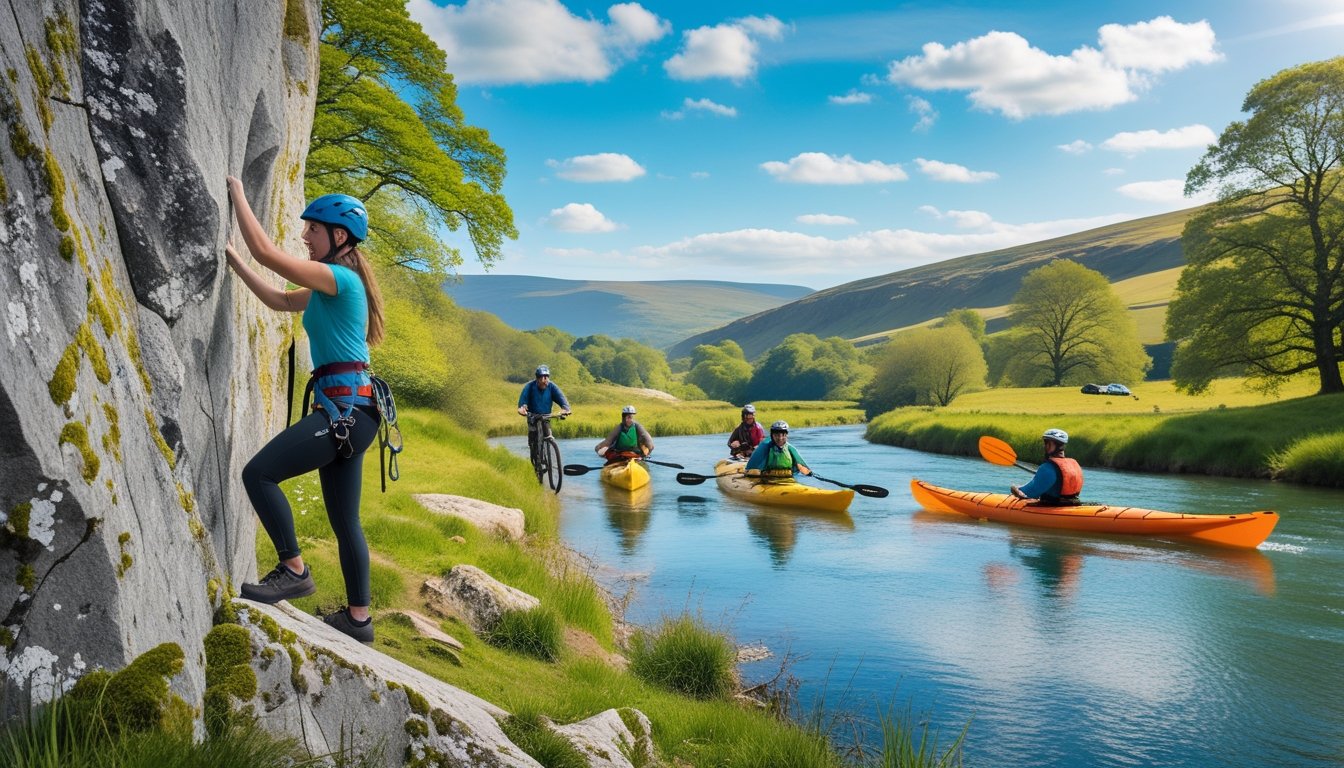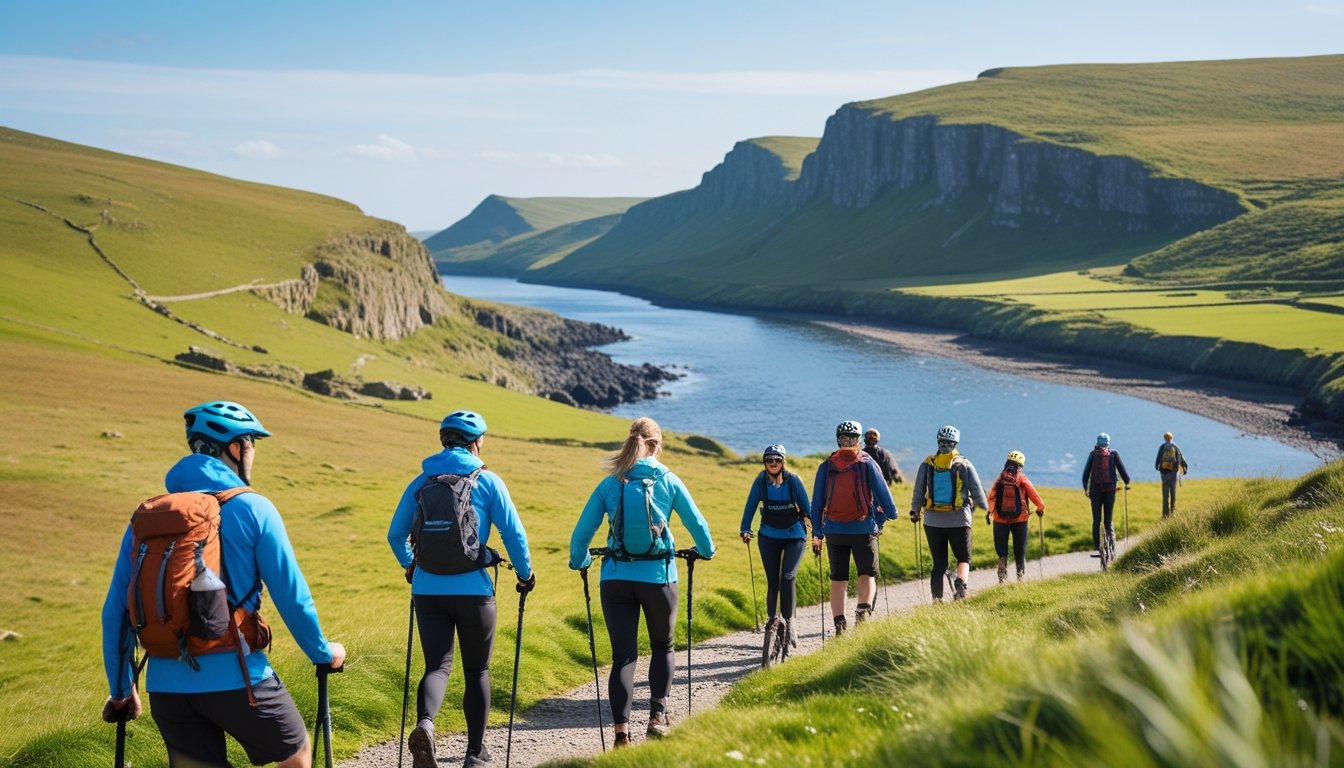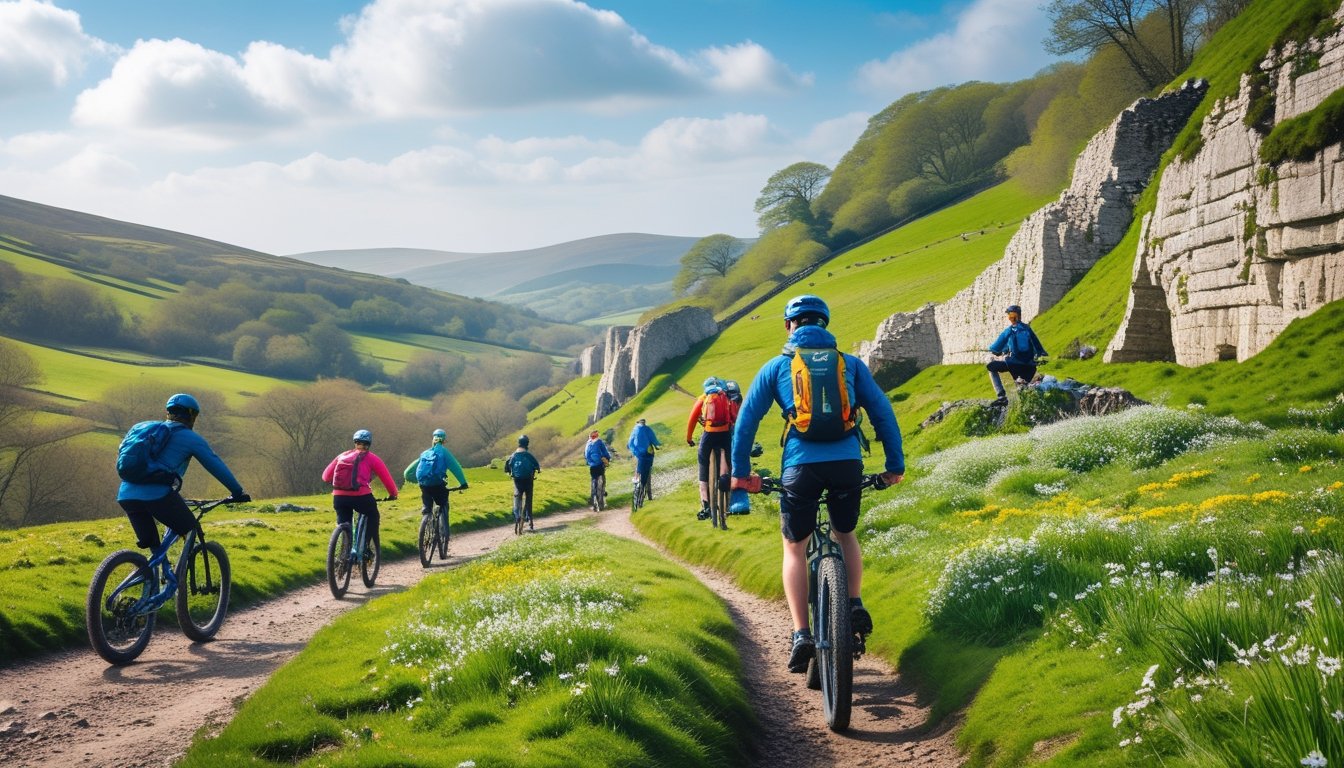Late updated: 18 Nov 2025 14:11
Written by: Emma Saunders
Exploring Emerging Outdoor Adventure Trends in the UK: Discover the Latest Developments
The United Kingdom, with its diverse landscapes, has become a vibrant playground for adventure seekers of all kinds. Whether you're interested in the rush of cliff diving or the tranquillity of wild swimming, there's a thrilling experience waiting just around the corner. As adventure tourism continues to grow, the UK emerges with a robust reputation for unique outdoor activities that cater to all enthusiasts.

Consumer trends show that more people are keen to step out of their digital bubbles and into the great outdoors, embracing a lifestyle where thrill and nature go hand in hand. The rise in interest for adrenaline-fuelled experiences, such as wing surfing or canyoning, highlights a shift in how we choose to spend our leisure time. The nation’s commitment to enhancing its outdoor offerings ensures it remains a top-tier destination for those seeking unique and exhilarating adventures.
Key tourism spots across the country are adapting quickly to meet this growing demand, and with innovations in infrastructure and sustainable practices, the UK continues to offer more for explorers of every kind. From the rugged coastlines of Cornwall to the serene waters of the Lake District, each region offers its own distinct flavour of adventure.
Key Takeaways
- The UK is a leading destination for adventure tourism.
- Outdoor activities experience a shift towards adrenaline pursuits.
- Key regions adapt to meet changing tourist demands.
Key Trends in Outdoor Adventure Activities

Outdoor adventure activities in the UK are experiencing a dynamic shift. We are seeing an impressive growth in traditional hiking and running, alongside a booming interest in water sports like kayaking and wild swimming. Climbing activities, particularly rock climbing, are also on the rise, and the popularity of bike-related pursuits, such as e-biking and bikepacking, is expanding rapidly.
Growth in Hiking, Walking, and Running
Hiking, walking, and running have long been staples of outdoor recreation. In the UK, they have gained further traction as more people seek accessible and cost-effective ways to improve health and well-being. Numerous walking routes across the countryside offer scenic landscapes, encouraging both novices and seasoned enthusiasts to explore.
Hiking trails fluctuate in difficulty, catering to various fitness levels and preferences. Meanwhile, organised running events, from local park runs to marathons, continue to attract a diverse crowd. The physical and mental benefits, combined with the chance to immerse oneself in nature, have contributed to the surge in these activities.
Rising Popularity of Water Sports and Wild Swimming
Water sports are capturing the attention of adventure seekers in the UK. Activities such as canoeing, kayaking, and paddleboarding dominate this niche. Over 50% of businesses in the industry focus on these experiences, providing both adrenaline-pumping and tranquil options for enthusiasts.
Wild swimming has gained a dedicated following, as swimming in natural bodies of water offers a unique thrill and connection with the environment. Many take to lakes and rivers for leisure and fitness, benefitting from the open, natural setting.
While traditional water sports remain popular, increasingly innovative activities like e-foiling demonstrate the dynamic nature of this sector.
Surge in Climbing and Rock Climbing
Climbing activities, particularly rock climbing, are surging in popularity as more individuals seek challenges that require both mental and physical prowess. Indoor climbing walls have enabled an all-weather, year-round solution, attracting participants eager to hone their skills in a controlled environment.
Outdoor rock climbing, climbing festivals, and competitions stimulate interest among those looking for adventure in natural settings. Thrills of scaling cliffs and learning intricate techniques contribute to a sense of accomplishment and belonging among climbing communities.
Diverse locations across the UK provide an array of climbing opportunities, from the famous gritstone of the Peak District to the rugged Scottish Highlands.
Bikepacking, Mountain Biking, and E-Biking Trends
Cycling-based outdoor adventures are evolving, with bikepacking leading the charge. This combination of biking and minimalistic camping allows for an immersive, multi-day experience, popular for its freedom and exploration appeal.
Mountain biking continues to attract outdoor enthusiasts drawn by technical trails and exciting descents. The development of bike-friendly parks and trails further supports this interest.
E-biking has revolutionised the sector, making journeys accessible to a broader audience. This variant offers the thrill of cycling with less physical strain, appealing to both seasoned adventurers and newcomers. Consequently, more e-bike rental offerings are popping up across the country.
These trends point to a vibrant future for outdoor activities, with broadening participation across various demographics.
Adventure Tourism and Regional Hotspots

Adventure tourism in the UK continues to evolve rapidly, driven by market growth and shifting demographics. Committed to sustainability, eco-tourism and staycations are here to stay. Some key hotspots include the Lake District, Peak District, and Cornwall, where diverse nature-based activities abound. Understanding the differences between soft and hard adventure experiences can guide adventurers in choosing their pursuits wisely.
Adventure Tourism Market Growth and Demographic Shifts
In recent years, the adventure tourism market in the UK has expanded significantly. A wider range of demographics, including younger generations and older adults, are seeking thrill and connection with nature. Our preferences are shifting towards meaningful and immersive experiences rather than mere sightseeing.
Table: Key Demographic Shifts
| Group | Interest |
|---|---|
| Millennials | Adventure + Authentic Experiences |
| Baby Boomers | Active Wellness + Nature |
This market expansion invites businesses to diversify offerings, from hard adventure activities like paragliding to softer options such as wildlife watching.
Sustainable Travel, Eco-Tourism, and Staycations
We are witnessing a strong movement towards sustainable travel practices. Both eco-tourism and staycations stand out as more environmentally friendly options, encouraging us to experience the beauty of local landscapes without the environmental cost of long-distance travel.
The emphasis on reducing carbon footprints has encouraged us to engage more with local initiatives and support communities. The UK’s aim for a greener future is spurring innovation in eco-friendly accommodations and transportation.
Top Destinations: Lake District, Peak District, and Cornwall
Lake District: Known for stunning landscapes, it's perfect for hiking and soft adventures. The region is also favoured for its tranquil lakes and historic cottages.
Peak District: As England's first national park, it offers routes for both casual walkers and experienced hikers. It's ideal for those interested in geological wonders and quaint villages.
Cornwall: From surfing along its picturesque coastline to exploring its scenic cliffs, Cornwall provides exciting hard adventure opportunities.
Soft Adventure vs Hard Adventure Experiences
Our choices in adventure tourism often fall between soft and hard adventure experiences.
Soft Adventure: Suitable for most fitness levels, these activities, like wildlife watching and easy hiking, offer leisurely engagement with nature. They require minimal equipment and can often be family-friendly.
Hard Adventure: For those seeking a more intense experience, activities such as paragliding and mountain climbing demand high adrenaline and technical skills. These pursuits are geared towards those ready to push personal limits.
Our emphasis on both adventure types reflects the diverse interests present in today’s adventure tourism landscape.
Frequently Asked Questions

As adventure tourism evolves in the UK, several trends emerge, shaped by technological advancements, sustainability, and changing destinations. Understanding these aspects can enhance experiences for adventure seekers by ensuring safety and exploring the influence of social media.
What are the latest trends in UK adventure travel?
In the UK, adventure travel is embracing activities like wing surfing, e-biking, and wild swimming. There's a noticeable shift towards eco-conscious and personalised experiences, attracting a broader range of enthusiasts, including older travellers interested in active adventures.
How is technology shaping outdoor activities in the UK?
Technology is transforming outdoor activities with the integration of GPS tracking, virtual reality simulations, and advanced safety gear. These innovations offer adventure seekers enhanced experiences and safety, making activities more accessible and appealing.
Which new destinations are gaining popularity for adventure seekers in Britain?
Remote and unexplored locations such as the Scottish Highlands and Pembrokeshire Coast are gaining traction among adventure travellers. These areas offer unique landscapes and less crowded experiences that appeal to those seeking new challenges and solitude in nature.
What safety considerations should be accounted for in modern UK adventure tourism?
Safety in adventure tourism is paramount, with considerations including proper equipment, knowledge of the terrain, and awareness of weather conditions. Using technology like GPS tracking ensures that adventurers can safely enjoy their pursuits with adequate preparation.
How are sustainability concerns influencing outdoor adventure activities in the UK?
Sustainability is a focal point, with a growing emphasis on eco-friendly practices. This includes minimising environmental footprints, supporting local communities, and using sustainable gear, ensuring that adventure activities don't harm the natural landscapes.
What impact has social media had on the popularity of adventure activities in the UK?
Social media has significantly boosted the visibility and popularity of adventure activities. Platforms allow enthusiasts to share experiences, discover new destinations, and connect with like-minded individuals, fostering a vibrant community of adventure seekers in the UK.
